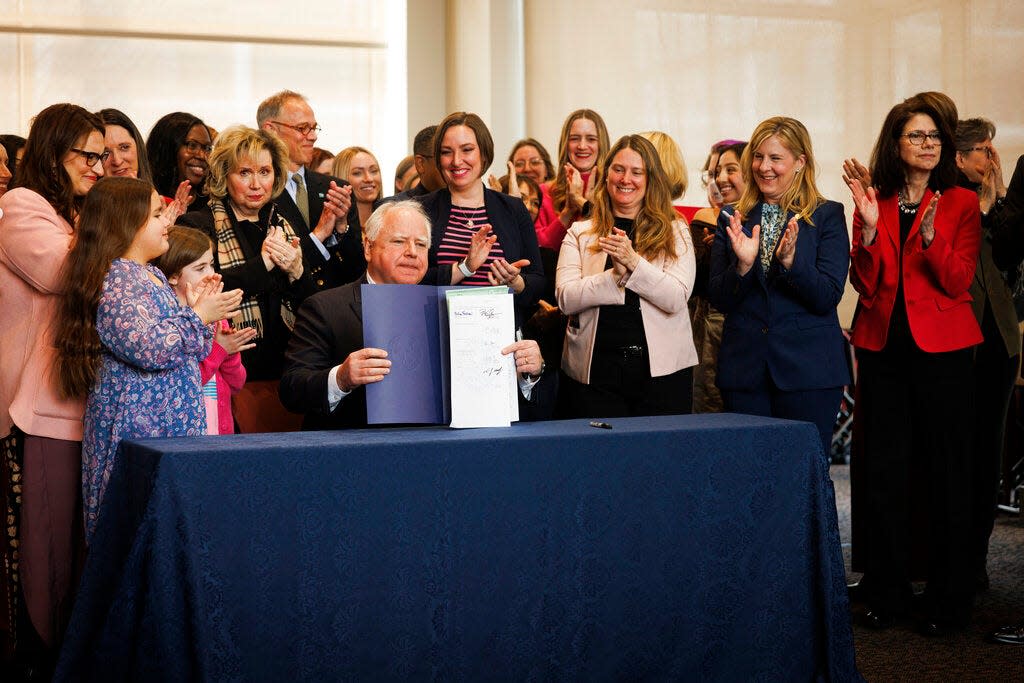"We will continue serving our neighbors": One year of Minnesota's abortion rights bill

ST. PAUL — On Monday, Democratic Gov. Tim Walz and Lt. Gov. Peggy Flanagan held a roundtable in St. Paul with local Planned Parenthood providers and staff in the wake of the growing number of abortion bans nation-wide.
This month marks one year since Minnesota became the first state to codify abortion rights via the legislature. The signing of the Protection of Reproductive Options (PRO) Act came in the wake of the landmark 2022 Supreme Court decision overturning Roe v. Wade, leaving reproductive rights up to the states.
Since the decision, states across the nation have worked both to ensure the right to abortion as well as restrict it, even in cases of incest and rape. Data from the Guttmacher Institute shows that Minnesota is rated as an island of "protective" in terms of abortion access, surrounded completely by "restrictive" to "most restrictive" states.
Planned Parenthood North Central States CEO Ruth Richardson said during the roundtable that out-of-state patient intake has increased by 100% and overall abortions performed up 25%.
"Abortion bans don't ban abortion for everyone," she said. "They only ban abortion for people who don't have an opportunity to travel."
More: Online abortion provider Hey Jane expanding services to Minnesota
The former state representative said that for the first time, Planned Parenthood clinics are seeing patients traveling from as far as Texas and Florida to obtain reproductive health services.
As more states continue to place restrictions on abortion access, Richardson said they are anticipating needing to expand their care to even more non-Minnesotans.
The PRO Act
Known as the PRO Act, the Protect Reproductive Options Act was signed into law by Gov. Walz last January, marking another landmark piece of legislation passed by the DFL-led statehouse in 2023.
Defined by the act, reproductive health care includes:
Abortion care
Maternity care
Contraception
Preconception care
Sterilization
Family planning and fertility services
Reproductive health care counseling
The law codified reproductive freedom, directly contradicting the language of the Supreme Court's decision reversing those federal rights in Dobbs v. Jackson by recognizing abortion as a matter of privacy and therefore protected by the state.
"Every individual has a fundamental right to make autonomous decisions about the individual's own reproductive health, including the fundamental right to use or refuse reproductive health care."
Protection of Reproductive Options Act, Minn. Stat. § 145.409. (2023).
A "firewall" for protecting abortion access
Gov. Walz said during the roundtable discussion that Minnesota would continue to be a "firewall" of protection for reproductive rights.
The hot button issue of abortion did not fade away with the overturning of Roe. More and more Republican-led states are implementing bans at the same time pro-choice voters are showing up to the polls to protect access.
On Friday, the Supreme Court allowed a near-total abortion ban in Idaho to stay in place, agreeing to hear the case this spring. They also agreed to take up the case regarding access to the abortion pill mifepristone.
Regardless of who sits on the Supreme Court, Walz said that Minnesota will continue "serving our neighbors", acting as an "island of decency."
— Sam Woodward is the Minnesota Elections Reporting Fellow for USA Today. You can reach her at swoodward@gannett.com and on X @woodyreports
This article originally appeared on Aberdeen News: One year of abortion rights bill: Protecting access for other states
